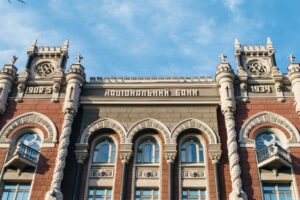
The National Bank, in cooperation with international partners, is working on reforming the infrastructure of the Ukrainian capital market. This was announced by First Deputy Head of the NBU Serhiy Nikolaychuk in an interview with the Interfax-Ukraine news agency.
According to him, the goal is to adapt Ukrainian regulations to European standards, improve investor protection, and create a basis for the inflow of long-term capital after the war. “We want the Ukrainian market to be as integrated as possible into the European financial space,” Nikolaychuk said.

The National Securities and Stock Market Commission (NSSMC) on Thursday adopted Decision No. 1053, which canceled almost all restrictions on capital and commodity markets introduced since the start of the full-scale Russian invasion.
“The step to unblock the capital and commodity markets is timely and balanced, because market participants have confirmed their readiness for the development of the financial sector,” Prime Minister Denys Shmigal said in a statement from the National Securities and Stock Market.
According to him, even before the war, the renewal of the stock market was identified as one of the government’s priority initiatives.
“After our victory, the development of capital markets and commodity markets may become one of the drivers for the recovery of the economy and Ukraine as a whole,” the prime minister said.
Ruslan Magomedov, the head of the National Securities and Stock Market Commission, noted that during the five months of the war, the capital markets and commodity markets worked in manual mode.
“The regulator carefully monitored and analyzed the results of each authorized operation. In civilian life, this is nonsense, but the war dictated its conditions. Thanks to an individual approach and a prudent position, we were able to overcome panic, preserve assets and prevent defaults on a number of securities,” he said. head of the regulator.
The decision comes into force on August 8 this year, the document states.
According to it, the bans remain in relation to transactions related to individuals and legal entities of the Russian Federation and Belarus.
In addition, settlements on the second part of the REPO operation under REPO agreements concluded before the start of the war, as well as applications for redemption from participants in joint investment institutions of open and interval type, are allowed only from August 22, and for earlier transactions, permission from the Commission is required.
As reported, the Verkhovna Rada last week adopted a law “on the specifics of the activities of the financial sector in connection with the introduction of martial law in Ukraine” (No. 7465-1), which makes it possible to ease these restrictions. However, this document has not yet been signed by the president, according to the information on the website of the parliament.

The accession of the Ukrainian market to the network of the Clearstream international depositary is a very important step for the infrastructure, ensuring long-term prospects for the capital market in Ukraine, and the National Bank (NBU) intends to further actively develop the market infrastructure, as it considers it to be its area of responsibility, Deputy Governor of the NBU Oleg Churiy has stated.
“[Joining Clearstream] is the most important reform in the capital market over the past five years. It will provide an opportunity to more actively attract funds from non-residents,” he told the Interfax-Ukraine news agency on the sidelines of the Sweden-Ukraine Business Forum held in Kyiv.
Commenting on the opinion that such a simplification of entry/exit of non-residents to the Ukrainian market threatens with the outflow of their funds, Churiy noted that “only one-third of the short-term money of non-residents [are invested in government domestic loan bonds] maturing this year, while two-thirds [are invested in those maturing] next year.”
The banker added that often non-residents invest these funds in new government bonds, therefore this does not mean that they will leave immediately after the bonds are redeemed.
At the same time, Churiy stressed it is necessary to do a lot more for the development of Ukraine’s capital market, and the National Bank intends to actively participate in this process.
CAPITAL MARKET, CLEARSTREAM, INTERNATIONAL DEPOSITARY, REFORM, UKRAINE'S